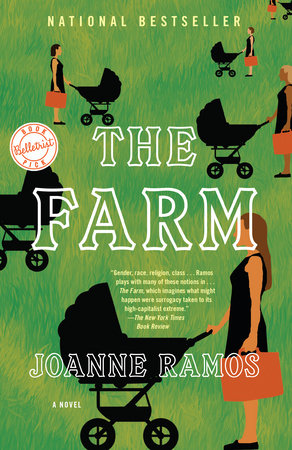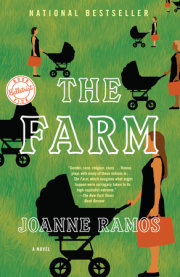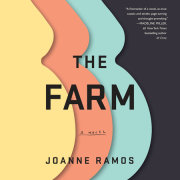It is Jane’s first day. Her interview at Golden Oaks was only six weeks ago, but it seems like everything has changed. An unknown baby lies in her stomach, and she is a hundred miles away from Amalia, surrounded by strangers. The smiling woman who greeted her in the Dorm’s lobby this morning took not only her suitcase and wallet but her cell phone, so Jane has no sense of the time, and she feels even more cut off from her daughter.
Jane rolls up her sleeve and extends her arm, wondering if she is getting another shot, and why, since she is already pregnant.
The Coordinator straps a bracelet onto Jane’s wrist, rubber or rubbery looking, and pushes a button that makes its thin, rectangular screen light up. “This is a WellBand. Custom-made for us. I gave you red ‘cause it was just Valentine’s day!”
Jane stares at it. Mrs Davis used to wear something like it, a circle of blue plastic like a child’s toy that looked strange next to her diamond tennis bracelet, the gleaming ovals of her nails.
“It tracks your activity levels. Try jumping.”
Jane begins to jump.
“See?” the Coordinator angles the bracelet face toward Jane. The green zeroes that had once filled the screen have been replaced by orange numbers that climb steadily as Jane hops, growing short of breath.
“You can stop,” says the Coordinator, but in a friendly way. She holds Jane’s wrist and guides the bracelet over a reader attached to a laptop until the reader bleeps. “There. Now you’re synched up with our Data Management Team. Let’s say your heart rate spikes—this happens, it’s usually no biggie, but it can also signal some underlying irregularity in your heart, pregnancy being a strain on your tick-tocker,” the Coordinator—Carla?—pauses, waiting for the severity of this possibility to set in. “We’ll know immediately, can whisk you in to see a nurse. Or if you’re not getting enough exercise, we’ll have Hanna all over it.” Carla grins, “All over
you.” Her freckled cheeks fold into dimples. Jane has never seen so many freckles in her life—freckles on top of freckles receding into freckles.
“Hanna…?”
“She’s our Wellness Coordinator. You’ll get to know her
real well,” Carla winks at Jane. She runs through a tutorial of the WellBand—its various monitors, timers, the alarm and snooze and panic buttons, the GPS locator, calendar, alerts, how to receive announcements.
“How do the clothes fit?” Carla’s eyes rake over Jane, head to toe and back up again. Jane feels her face grow hot. In truth, she has never worn clothes so thin and so soft. Just this morning in her winter coat, she was freezing. Ate and Amalia waited with her on the street outside their apartment building for the car to arrive, Amalia buried under so many layers of wool and fleece that Jane could barely see her face. But here, in clothes light as air that fit her perfectly, Jane is warm. Jane says so to Carla.
“Cashmere,” Carla answers matter-of-factly. “Golden Oaks doesn’t skimp, that’s for sure.”
There is a knock on the open door. “Hi Jane,” sings Ms Yu, giving Jane a stiff hug.
“Hello Ms. Yu,” Jane jumps to her feet.
“Please. Sit. I just wanted to make sure you’re settling in.” Ms Yu takes a seat on the bench next to Jane. “How’s the morning sickness? Is your room okay? Did you meet Reagan?”
“I feel okay, only a little tired,” Jane answers. “The room is beautiful. So are the clothes.” Jane rubs the cashmere on her thigh with her palm, “I have not yet met my roommate.”
Ms Yu frowns slightly.
“But,” Jane says quickly, not meaning to get her roommate into trouble, “I have only been here since nine o’clock, and I had the check-in with the nurse. I have been busy.”
Ms Yu’s face relaxes. She places a hand on Jane’s hand. “I’m guessing Reagan was tied up with an appointment. She’ll be around soon, I’d think. This is your new home, we want to help you
feel at home.”
At the word “home”, Jane’s throat tightens. It is past eleven, and by now Amalia is likely strapped into her bouncy chair, thighs jiggling from the chair’s battery-powered vibrations, waiting impatiently for Ate to fix lunch.
As if sensing Jane’s thoughts, Ms Yu asks, “How’s Amalia? Was the goodbye hard?”
Jane is pierced by gratitude that Ms Yu, who is so busy, remembers Amalia’s name. She shifts her gaze to the wall so that Ms Yu cannot see her eyes, which are teary. “It was fine. Amalia is almost seven months now; she is a big girl. And she has my cousin.”
“She’s in good hands, then.” Ms Yu’s voice is kind.
Jane still does not trust herself to face Ms Yu. She can hear Carla’s fingers tapping on a keyboard.
“I know you know our policy, Jane, which is that we don’t allow visitors, and we don’t allow Hosts offsite unless at the request of a Client.” Ms Yu leans closer to whisper, “But I think we can convince your Client to let Amalia come see you.”
“Really?” Jane blurts, almost exploding with gratitude to Ms Yu.
Ms Yu puts a finger to her lips and smiles. She asks Jane if she is ready for lunch and, when Jane confesses she was too nervous this morning to eat, leads her to the dining hall. Jane trails several steps behind, wiggling her toes in her new fur-lined moccasins, a tentative sense of well-being creeping over her. Ms Yu keeps up a constant stream of chatter, pointing out her favorite views of the mountains, giving Jane bits of trivia about the surrounding towns. As they walk, Jane imagines Amalia here—hiding beneath the soft blankets draped on the sofas, mesmerized by the fires crackling in the stone fireplaces.
“Do you think you’ll feel at home here?” Ms Yu asks. She pushes the dining room door open with her shoulder.
“Oh yes,” says Jane, and she means it.
Copyright © 2019 by Joanne Ramos. All rights reserved. No part of this excerpt may be reproduced or reprinted without permission in writing from the publisher.








